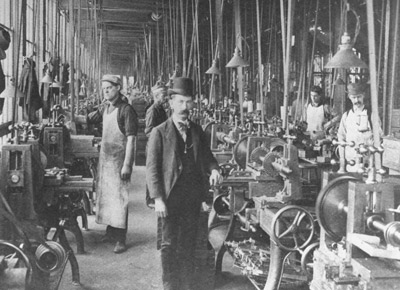What was the industrial revolution?
What was the industrial revolution?: In history, many mistakenly associate the industrial revolution to the great economic and industrial development of England in the 70 years covered the last half of the eighteenth century and the first decades of the nineteenth century. It is not really a serious mistake because that was the time and place that comes up when the revolution but, strangely enough, it owes much to the Middle Ages, we know who have called the period of obscurantism that is not strictly true, actually is a process of maturation of ideas and knowledge accumulation for obvious reasons until that occurs beyond the invention of printing, improved communications and increased average life of citizens Europeans.
The invention of the steam engine is unprecedented even in antiquity, which James Watt achieved is to build a regulating device which prevents machines that explode and become real working devices. Understood this fact, this period begins Watt but he would give the honor of the invention of the steam engine. Its use implies obtaining skilled labor, cheap and abundant that comes thanks to an increase in the rural population moving into the cities in search of work. The maquilas designed machines used in the Middle Ages, for example cards that kept the guide needles which were useful for different designs, simply had to adapt and allow the steam to do more work in less time efficient. For the first time a country could accumulate money capital significantly allowing him to "finance" not only their own welfare but also to other countries making room to capitalism in its purest form that has seen.
I do not overshadow the brilliance of the historical moment but there were great injustices that I can not mention at the very poor living conditions of the proletariat, children working in coal mines (whole families stated that they saw no sunlight in years), not to mention the great crime that these conditions occurred. Many people of the time are strongly influenced by this period such as Charles Darwin sees in nature a fierce struggle for resources and heartless competition to survive because in the England of his childhood he watched people and competing industries by the market and as some ended up being killed by others. Pure "natural" selection.
The theories of capitalism failed to predict that self-regulating markets for themselves without taking into account the human factor that often could manipulate markets to take advantage of fluctuations. It must be admitted that it is a brilliant period of history but not forget the flaws that had to not make the same mistakes. You could say that there was a very difficult transition period, like all radical change but over time ended up benefiting people in many areas, after the industrial revolution, became available in a "massive" first products consumer previously unthinkable for the general public (quality clothing at affordable prices, then cars, etc ...), and we must not forget that virtually all pre-industrial societies existed in some or other way of slavery, which is closely related and beyond the scope of this article.
What was the industrial revolution? 2012

0 comentarios:
Publicar un comentario